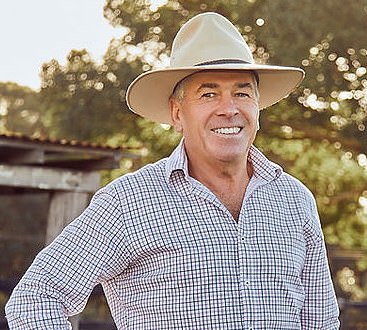The Aussie beef industry was briefly shocked on Thursday morning when US President Donald Trump said he would ban Australian beef imports.
Those fears soon faded when it was announced Australian beef, Australia’s biggest export to the US, would slapped with a 10 per cent reciprocal tariff.
The Mutooroo Pastoral Company managing director James Morgan said things could have been worse.
‘If it was a ban this discussion would be a lot more serious and there would be a lot of disappointed and angry people,’ he told Daily Mail Australia.
While the news of the tariff was still disappointing, industry figures said American consumers would be harder hit than Australian beef farmers, given a US drought is making it hard to produce enough lean, grass-fed beef needed to make hamburgers.
Red Meat Advisory Council independent chairman John McKillop also heard news of the ban and was relieved to hear it was not true.
‘My initial reaction was a bit of a heartbeat skip when he singled out beef over and above any other industry in any other country,’ Mr McKillop said.
‘What we need is our politicians to go over to the US and try to get that 10 per cent tariff removed and that should be happening as soon as possible.’

Red Meat Advisory Council independent chairman John McKillop said American consumers will lose out most under Donald Trump’s beef tariff announcement
Mr McKillop said the beef tariff, which came into effect at 3pm AEDT on Thursday, signalled that America ‘just won’t be seen as a reliable trading partner’.
‘It’s disappointing when you think you’ve got a friend that you’ve traded with for free for 20 years and they turn around and do this,’ Mr McKillop said.
In 2024, the US imported a record 400,000 tonnes of Australian beef.
Mr McKillop suggested the tariffs would hurt Americans in the long run, given the US is in drought and is only able to produce inferior, grain-fed beef which is much fattier.
‘The only person who is going to lose out of this is the US consumer who is going to pay more for their product,’ he said.
Grass-fed beef made up 96 per cent of Australia’s beef exports to the US in 2024, and this leaner product is needed to make hamburgers.
‘While the US is our biggest market for beef, predominantly what goes in there is trimmed,’ Mr McKillop said.
‘They take our lean frozen trim and mix it with their fresh fatty trim to make their beef patties for their beloved hamburgers.

It’s been claimed that Aussie beef farmers had more pressing issues than worrying about Donald Trump’s tariff announcements
‘No other country is capable of supplying the lean trim that Australia is so they’re going to continue to import it and the 10 per cent tariff will be passed on to the US consumer.’
South American beef producers Chile, Argentina and Brazil will also incur 10 per cent tariffs, but like the US, they are also battling a drought.
Mr McKillop also predicted the tariffs would likely be the catalyst for Australia to try and establish a trade agreement with the European Union (EU).
In 2023, a free trade agreement between Australia and the EU collapsed after Australia claimed the EU had not offered Aussie exporters of beef, sheep, dairy and sugar enough access.
NSW Farmers Association trade committee chair John Lowe agreed and said Australia’s beef trading relationship with the EU could be back on.
‘I’m hearing on the grapevine that the EU is interesting in talking to us again,’ he said.
‘Being able to have a discussion again is probably very helpful. Most of our exporters are not fools. They know this has been planned for a while.’
Trade Minister Don Farrell said Trump’s tariffs on Europe may bring them back to the negotiating table with Australia.
‘The world has changed as of today,’ Mr Farrell said.

NSW Farmers Association trade committee chair John Lowe said Australia’s biosecurity was more important than the beef tariffs imposed by Donald Trump
‘If they’re (EU) sensible, they will make up a better offer on the issues that made the (trade) agreement fall over last time, and we’ll get a free trade agreement with the EU, the largest economy in the world.’
Trump also stated that Australia had banned American beef which Mr McKillop said was not true.
‘All we ask is that they obey biosecurity protocols which means they have to give us traceability of where that animal was born, raised and slaughtered,’ he said.
‘They don’t want to comply, and they refuse to implement a traceability system so no beef comes in.’
Mr Lowe warned that the beef tariff should not compromise Australia’s biosecurity stance.
‘One thing that is important, agriculturally, is that we don’t trade out our biosecurity precautions in Australia for a short-term gain,’ he said.
‘Our biosecurity is way too important. We need to be strengthening it, not reducing it.’
Mr Lowe claimed Aussie farmers had more pressing issues to worry about than Trump’s tariffs.
‘Bigger factors that are affecting us are the dry times in the south and the floods in the north,’ he said.
‘But if you’ve got grass and you’ve got cattle, I wouldn’t be panicking too much yet.’






